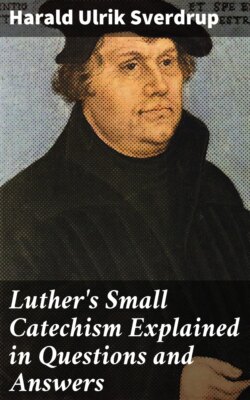Читать книгу Luther's Small Catechism Explained in Questions and Answers - Harald Ulrik Sverdrup - Страница 3
На сайте Литреса книга снята с продажи.
ОглавлениеCOPYRIGHTED BY
The Free Church Book Concern
1900.
Table of Contents
PREFACE.
Table of Contents
In 1897 the present publishers issued in Norwegian an Explanation of Luther's Small Catechism by Pastor H. U. Sverdrup, being an abridged edition of a larger work by the same author, based on Dr. Pontoppidan's Explanation of the Catechism. Some alterations were made in the answers to questions 244–252. The present work is a translation of this abridged and slightly altered edition.
A literal translation has been avoided rather than sought; an attempt has been made to render the original in the simplest and strongest English, and to avoid words and expressions with which the young are little familiar.
In the catechism proper the Standard English Catechism Version has been followed when it did not interfere with the plan stated above. But departures have been made reluctantly and only when simplicity and clearness seemed to be gained thereby. It is not thought that these few changes will cause any disturbance.
Scripture quotations have been added somewhat freely from the larger edition.
As the needs of our English speaking young people have been constantly borne in mind during the preparation of this translation, it is hoped that the book may not fail to carry some blessing to them.
October, 1900.
The Translator.
Luther's Small Catechism.
Table of Contents
PART ONE.
Table of Contents
THE TEN COMMANDMENTS.
Table of Contents
THE FIRST COMMANDMENT.
Thou shalt have no other gods before me.
That is,
We should fear, love, and trust in God above all things.
THE SECOND COMMANDMENT.
Thou shalt not take the name of the Lord thy God in vain; for the Lord will not hold him guiltless that taketh his name in vain.
That is,
We should fear and love God, and not curse, swear, conjure, lie, or deceive by His name, but call upon His name in every time of need, and worship Him with prayer, praise, and thanksgiving.
THE THIRD COMMANDMENT.
Remember the Sabbath day to keep it holy.
That is,
We should fear and love God, and not despise or neglect His Word, but deem it holy and gladly hear and learn it.
THE FOURTH COMMANDMENT.
Honor thy father and thy mother, that it may be well with thee, and thou mayest live long on the earth.
That is,
We should fear and love God, and not despise or give offense to our parents or superiors; but honor, serve, obey, love, and esteem them.
THE FIFTH COMMANDMENT.
Thou shalt not kill.
That is,
We should fear and love God, and not hurt or harm our neighbor in his body, but help and befriend him in all bodily distress.
THE SIXTH COMMANDMENT.
Thou shalt not commit adultery.
That is,
We should fear and love God, and live a chaste and pure life, in words and deeds, husband and wife loving and honoring each other.
THE SEVENTH COMMANDMENT.
Thou shalt not steal.
That is,
We should fear and love God, and not take our neighbor's money or property, nor get it by unfair dealing or other dishonesty, but help him to improve and protect his property and living.
THE EIGHTH COMMANDMENT.
Thou shalt not bear false witness against thy neighbor.
That is,
We should fear and love God, and not tell lies about our neighbor, nor betray, slander, or defame him; but excuse him, speak well of him, and look upon all his acts as well-meant.
THE NINTH COMMANDMENT.
Thou shalt not covet thy neighbor's house.
That is,
We should fear and love God, and not by deceit or craft seek to gain our neighbor's inheritance or home, nor try to get it though we seem to have some right thereto, but help him to keep his own.
THE TENTH COMMANDMENT.
Thou shalt not covet thy neighbor's wife, nor his man-servant, nor his maid-servant, nor his cattle, nor anything that is his.
That is,
We should fear and love God, and not estrange, force, or entice away from our neighbor, his wife, servants, or cattle, but urge them to stay and do their duty.
